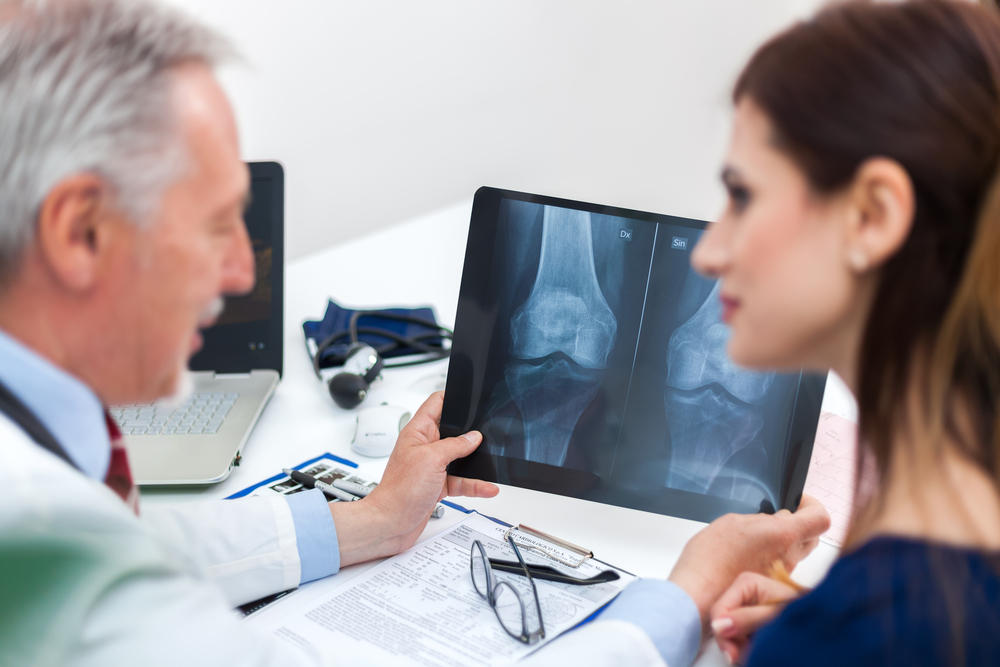Compression Fractures and Osteoporosis
PUBLISHED ON:
March 5, 2020
As we age, our bones get weak, thin, and prone to diseases such as osteoporosis. Osteoporosis is a medical condition where your bones become fragile and weak. This is typically because of hormonal changes, loss of tissue, or calcium and vitamin deficiency.
Osteoporosis can go unnoticed for years, silently affecting your bones until they break or become damaged. The spine, made up of bones called vertebrae, is prone to osteoporosis which causes spinal fractures – called vertebral compression fractures. These fractures are almost twice as common as any other type of fracture associated with osteoporosis.

Compression Fractures and Osteoporosis
Compression fractures are a type of fracture, or break, in your vertebrae. When your bones are weakened due to osteoporosis, there is a higher chance of experiencing compression fractures. The vertebrae are bones stacked on top of each other, which compile your spine. The spine has an important job – to support your weight, allow movement, and protect the nerves in your spinal cord.
When you suffer from compression fractures, the spine grows weak and can cause the vertebrae to break or collapse. Vertebrae that collapse become shorter in height and the broken pieces of bone are more susceptible to pressing on the spinal cord and nerves.
Causes of Compression Fractures
While osteoporosis is a leading cause of compression fractures, there are many other causes. Because the bones are fragile, injuries that cause damage to the spine also cause vertebral compression fractures.
Other causes include:
-
Car Accidents
-
Sports injuries
-
Tumors in the spine
Tumors occasionally start in the vertebrae, but more commonly, it spreads there from another part of the body via bone.
Compression fractures can occur when too much pressure is applied to the weakened spine and it cracks. Injuries can also be a result of a fall or activities that are common to everyday life – reaching, twisting, and even coughing.
Symptoms of Compression Fractures
You may know you have osteoporosis because it can affect other parts of the body, but you may not know that you are suffering from a compression fracture. These fractures develop over time and it’s possible to not see symptoms right away. In fact, many compression fractures are discovered when you have an X-Ray for another reason.
If compression fractures go undiagnosed for too long, symptoms may occur. They can include:
-
Back Pain: standing or sitting for too long may worsen back pain.
-
Decrease in height: The collapsed vertebrae may shorten your spine, making you shorter.
-
Bad Posture: You may develop bad posture, called kyphosis. This makes you stooped forward because the front of the vertebrae loses height but the rear side of the bone does not.
-
Limited Motion: The inability to bend or twist is common when suffering from compression fractures.
-
Uncommon Sensations: Sensations that are uncommon are likely to occur. This can include numbness, tingling, bladder control, and trouble controlling your bowels because of nerve damage.
If the fracture is caused by a sudden accident, you may feel a sharp, severe pain that can be immediately disabling.
Treatment Options
A common treatment option for compression fractures is kyphoplasty. This treatment requires a consultation with you doctor.
-
Kyphoplasty: This is the procedure of choice for severe fractures. Kyphoplasty involves using a catheter with a small balloon inflated inside the vertebra. This increases the vertebral height prior to the stabilizing cement being injected.
Your physician may prescribe bone-strengthening medicine and calcium and vitamin supplements to promote bone health. Physical therapy is another treatment method that helps strengthen muscles and tendons that support your bones and help prevent fractures. Other types of treatment include wearing a back brace, bed rest to allow your bones to heal, or non-opioid pain medication.
PUBLISHED ON:
March 5, 2020


